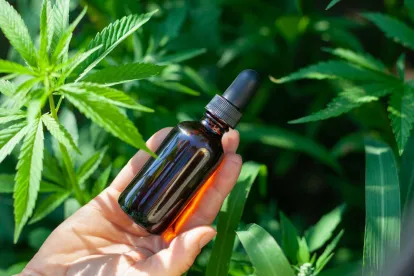In our modern world of a booming CBD industry and an increasing number of states that have legalized marijuana, can you terminate an employee for a positive drug test for marijuana? What if the test shows marijuana metabolites but you find out later it was a positive for CBD oil (a legal substance)? Does federal law protect an employee in any way in this scenario? In Rocchio v. E&B Paving, LLC, a federal district court in Indiana looked at this issue under the Americans with Disabilities Act and found no federal legal protection for the employee’s use of CBD oil.
Just the Facts
E&B prohibited the use of illegal drugs at their workplace and based the policy on safety concerns. It used a third party to administer random tests. E&B had a zero tolerance policy and immediately terminated employees who tested positive. One of the prohibited drugs for which E&B tested was marijuana.
Employee John Rocchio’s number came up, he took his drug test, and the test revealed marijuana metabolites in his system. The third-party testing administrator notified E&B that Rocchio tested positive for marijuana, and E&B terminated his employment. The employee who recommended the termination relied on the report of a positive drug test. A straightforward example of prohibited conduct and consequences, right? Not so fast, said Rocchio.
You Can’t Fire Me for Using CBD Oil!
Rocchio said he did not use marijuana, and the positive test was because he used CBD oil (also known as cannabinoid oil), a legally sold hemp extract. E&B relied on the drug test result rather than Rocchio’s plea of innocence and did not bring him back to work.
Rocchio filed a lawsuit claiming, among other things, that E&B violated the ADA by terminating him and not rehiring him. How was he disabled you ask? He argued that his employer “regarded” him as having a disability. The court found that even if Rocchio could prove that he was a qualified individual with a disability, he still could not prove he was terminated because of his disability and not the positive drug test.
ADA Doesn’t Prohibit Testing for Legal Substances
Just because the ADA does not say employers can test for legal substances (like CBD oil), does not mean they can’t. According to the opinion, Rocchio argued:
Because the ADA explicitly permits covered entities to prohibit the use of illegal drugs and to test for the use of illegal drugs, 42 U.S.C.§ 12114(c)-(d), but does not explicitly permit bans of legal drugs or testing for legal drugs, it follows that “it violates the ADA” if an entity takes an adverse action against an employee who tests positive from the use of CBD oil, a legal substance.
Clever, but the court did not agree. As an initial matter, the court held the ADA’s lack of explicit permission for a company to ban the use of legal substances does not mean the ADA prohibits such a ban. As we all know, a company can terminate an employee for any reason, fair or unfair, as long as it is not illegal. Also, E&B was not testing for CBD oil — it was testing for marijuana. The court pointed out that Rocchio presented no evidence that E&B knew the positive test result was because of CBD oil rather than marijuana. The report from the third-party testing administrator reported marijuana metabolites — not CBD oil.
No Evidence of a Perceived Disability
Now let’s get to the perceived disability claim:
Mr. Rocchio’s only evidence of discrimination is his argument that Defendants’ policy of terminating employees who test positive for drugs “categorically” “regards” them as users of illegal drugs and, because Defendants cite safety concerns as the rationale behind the policy, as having an impairment under the ADA.
Not so fast, said the court. First, just because E&B has a drug testing policy for safety reasons does not mean that it automatically believes every employee who tests positive has an impairment under the ADA. Even if E&B thought some employees who test positive will have an impairment, that does not mean it thinks all of them are impaired. Rocchio had to show that E&B thought he had an impairment. Second, an employer “does not have to tolerate unacceptable behavior” — like a positive test for illegal drugs — “even if that behavior is precipitated by an employee’s disability.” Finally, Rocchio had no other evidence of disability discrimination. Although two people (one an E&B employee) told him they were sorry to hear about his drug addiction, he had no evidence that those folks based the comments on anything other than “word of mouth” and speculation.
The court found no ADA violation and granted E&B’s motion for summary judgment.
Takeaways
This case raises interesting issues for employers. Rocchio says he was engaging in legal, off-duty behavior and it got him fired. This case suggests that if there is legal protection for him, it is not under the ADA. The facts that the court seemed to find most helpful for the employer were:
-
The employer did not target the employee for testing — it was random and a third-party administrator handled it.
-
The report to the employer was that the employee tested positive for marijuana metabolites. It never got a report about CBD oil or another legal substance.
-
The employer consistently terminated employees who tested positive.
So what can we learn from this case? Your drug test may report CBD oil as positive for marijuana. You may want to warn your employees about that potential. If you do not want to terminate CBD oil users, think about what steps you should take to avoid this scenario, perhaps by having CBD users disclose it before testing (like a prescription drug). Also, if you live in Indiana, this case is helpful. However, this may have ended differently in a state that has legalized marijuana and/or has a law protecting legal, off-duty conduct. Check your local laws to be sure.






 />i
/>i

